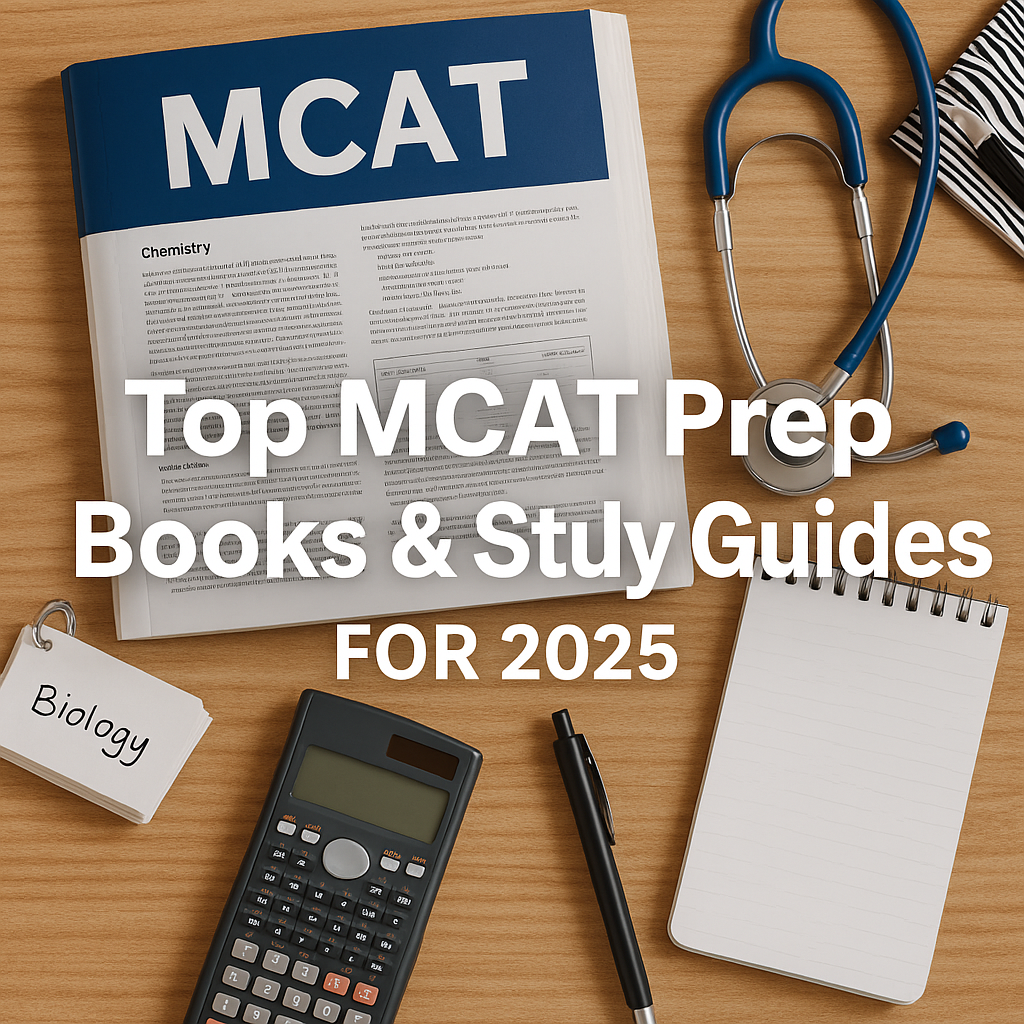
Each year, more than 85,000 students take the MCAT intending to enter medical school. With an acceptance rate hovering around 41%, competition is fierce, and having the right MCAT prep books can significantly improve your chances. The MCAT isn’t just a test of science knowledge—it measures critical thinking, reasoning, and your ability to apply information under pressure.
Choosing the best prep resources is one of the most important decisions you’ll make. The right book can help boost your score by 10 points or more, especially when paired with full-length practice exams and structured review. Whether you’re just beginning your study journey or looking to refine your approach, this guide highlights the most reliable, up-to-date MCAT study materials for 2025.
Key Takeaways
- Compare the Top Options: Get side-by-side insights on leading MCAT prep books like Kaplan, Princeton Review, Examkrackers, and AAMC Official Guides.
- Study Strategically: Discover which books provide the best content coverage, test-taking strategies, and realistic practice exams.
- Boost Your Score: The right tools can help students make major improvements, especially in high-weight sections like Chem/Phys and CARS.
- Stay Current: All featured study guides align with the AAMC’s official MCAT content outline and 2025 exam expectations.
1. Kaplan MCAT Complete 7-Book Subject Review 2025–2026
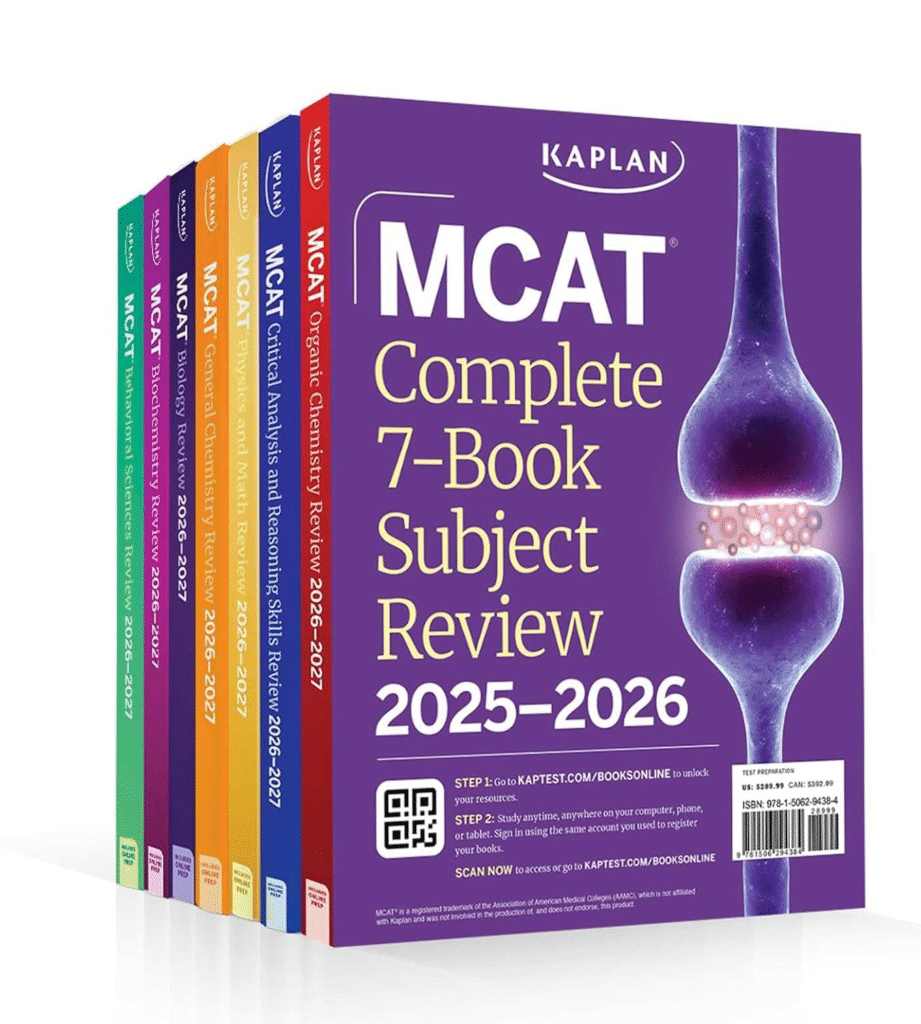
Kaplan’s MCAT Complete 7-Book Subject Review is a top choice among MCAT students looking for an all-inclusive and detailed study resource. This set covers every key MCAT topic, including Biology, Biochemistry, General Chemistry, Organic Chemistry, Physics, Behavioral Sciences, and Critical Analysis and Reasoning Skills (CARS). According to Kaplan, students who use their prep materials see an average score improvement of 7 to 10 points, which can be decisive for medical school admissions.
Key Features
- Seven comprehensive subject review books
- Three full-length online practice exams simulating the real MCAT
- High-yield badges highlighting essential concepts
- Step-by-step expert explanations for tough topics
- Updated CARS section emphasizing analytical reasoning
Pros
Comprehensive and Detailed Content Coverage
Kaplan’s seven books provide in-depth reviews across all MCAT subjects. This ensures no topic is overlooked and helps students build strong foundational knowledge, especially useful for those targeting top scores or needing a complete content refresh.
Alignment with Official MCAT Content
The “high-yield” badges guide students to focus on the most testable topics, directly aligned with the AAMC’s MCAT content outline. This targeted approach helps maximize study efficiency.
Realistic Practice Tests
Three full-length, online practice exams mimic the official MCAT format and timing. This realistic practice helps build stamina, improve pacing, and reduce anxiety on test day, which many students find invaluable.
Clear, Expert-Led Explanations
Kaplan excels at breaking down complex concepts, especially in challenging subjects like Biochemistry and Behavioral Sciences. The guided examples develop critical thinking and problem-solving skills, essential for MCAT success.
Updated CARS Strategy
The revamped CARS content shifts focus to analytical and critical reasoning skills rather than rote memorization, reflecting recent MCAT exam trends and improving students’ ability to tackle this notoriously difficult section.
Cons
Volume of Content Can Be Overwhelming
With seven comprehensive books, beginners or students with limited study time might feel daunted. Without a clear study plan, the large amount of material can lead to burnout or inefficient studying.
Higher Cost Compared to Alternatives
At approximately $179, Kaplan’s set is more expensive than some other MCAT prep resources. For students on a tight budget, this can be a significant investment.
Requires Strong Self-Discipline
The depth and volume of material require consistent motivation and good time management. Students who struggle with self-guided study may find it difficult to stay on track without additional support or structured programs.
Limited Practice Questions in the Books
While the books include some practice problems, they do not offer as many practice questions as standalone question banks. Many students find it necessary to supplement with official AAMC practice exams or other question banks for sufficient exam preparation.
Student Feedback
Students on forums such as Reddit’s r/MCAT frequently praise Kaplan for its detailed content and helpful practice tests. Many report improved confidence and scores but recommend pairing Kaplan materials with official AAMC tests for optimal preparation.
Pricing
- Around $179 for the complete 7-book set, including online practice exams
- Available on Kaplan’s official site and major retailers like Amazon
Bottom Line
Kaplan MCAT Complete 7-Book Subject Review 2025–2026 offers a comprehensive, all-in-one prep solution ideal for students committed to a deep, thorough study of MCAT content. Its realistic practice tests and updated strategies make it especially effective for those aiming for a competitive score. However, due to the volume and cost, motivated students with the time and discipline should work through extensive material. Pairing it with official AAMC practice exams will further enhance your readiness for test day.
2. Princeton Review MCAT Subject Review Complete Box Set
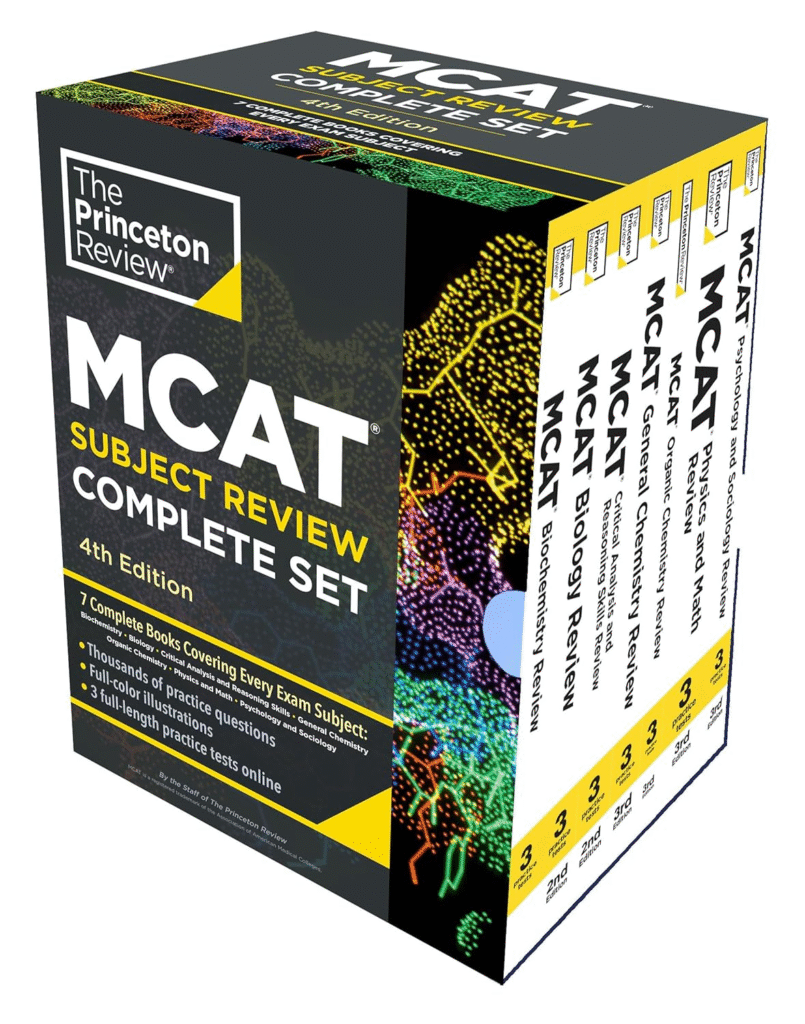
The Princeton Review MCAT Subject Review Complete Box Set is a popular choice for students seeking a structured and strategic approach to MCAT prep. This set includes seven subject-specific books covering all tested areas with clear explanations and practice questions designed to reinforce learning. According to Princeton Review, students who use their materials often see an average score improvement of 5 to 8 points, making it a reliable option for steady progress.
Key Features
- Seven subject-specific review books covering every MCAT topic
- Practice questions at the end of each chapter for immediate application
- Access to online resources, including practice tests and supplementary materials
- Clear content summaries and strategy tips tailored to the MCAT exam demands
Pros
Detailed Explanations and Strategic Insights
The Princeton Review excels at breaking down complex concepts into manageable sections, with clear explanations designed to build understanding step-by-step. Their strategic advice helps students not only learn the material but also approach questions more effectively.
Structured and Organized Content
Each subject book is thoughtfully organized, allowing students to follow a clear path through the curriculum. This structure supports systematic study habits, helping students avoid feeling overwhelmed by the breadth of MCAT content.
Practice Questions Reinforce Learning
End-of-chapter questions provide immediate opportunities to test comprehension and reinforce material. This active learning method helps students identify weak spots early and adjust their study plans accordingly.
Robust Online Resources
Purchasing the box set grants access to online practice exams and supplementary resources. These digital tools offer additional practice and simulate real testing conditions, which are essential for building exam readiness.
Cons
Content Redundancy Reported by Some Users
A number of students have noted overlap in explanations and content between books, which can feel repetitive and lead to inefficient study time if not managed carefully.
Less Focused on Test-Taking Strategies Compared to Kaplan
While the Princeton Review provides solid content and some strategies, it generally offers less emphasis on specific test-taking tactics than Kaplan’s materials. Students looking for detailed test-day approaches might find this limiting.
May Require Additional Resources for Practice Questions
Although the end-of-chapter questions are helpful, the quantity may not be sufficient for students seeking extensive practice. Supplementing with official AAMC question packs or third-party banks is recommended.
Student Feedback
Feedback on forums like Student Doctor Network often praises Princeton Review for its clear explanations and structured approach. Some users, however, suggest pairing it with other resources for a more comprehensive strategy, especially to boost CARS performance and timing skills.
Pricing
- Approximately $169 for the full box set with online access
- Available at Princeton Review’s website and retailers like Amazon
Bottom Line
The Princeton Review MCAT Subject Review Complete Box Set is an excellent resource for students who prefer a structured, step-by-step approach to mastering MCAT content. It combines detailed explanations with practice questions and helpful online materials, making it suitable for learners who want steady progress through consistent study. However, if you’re looking for more comprehensive test-taking strategies or an extensive question bank, pairing it with other resources might be necessary.
3. Examkrackers MCAT Complete Study Package
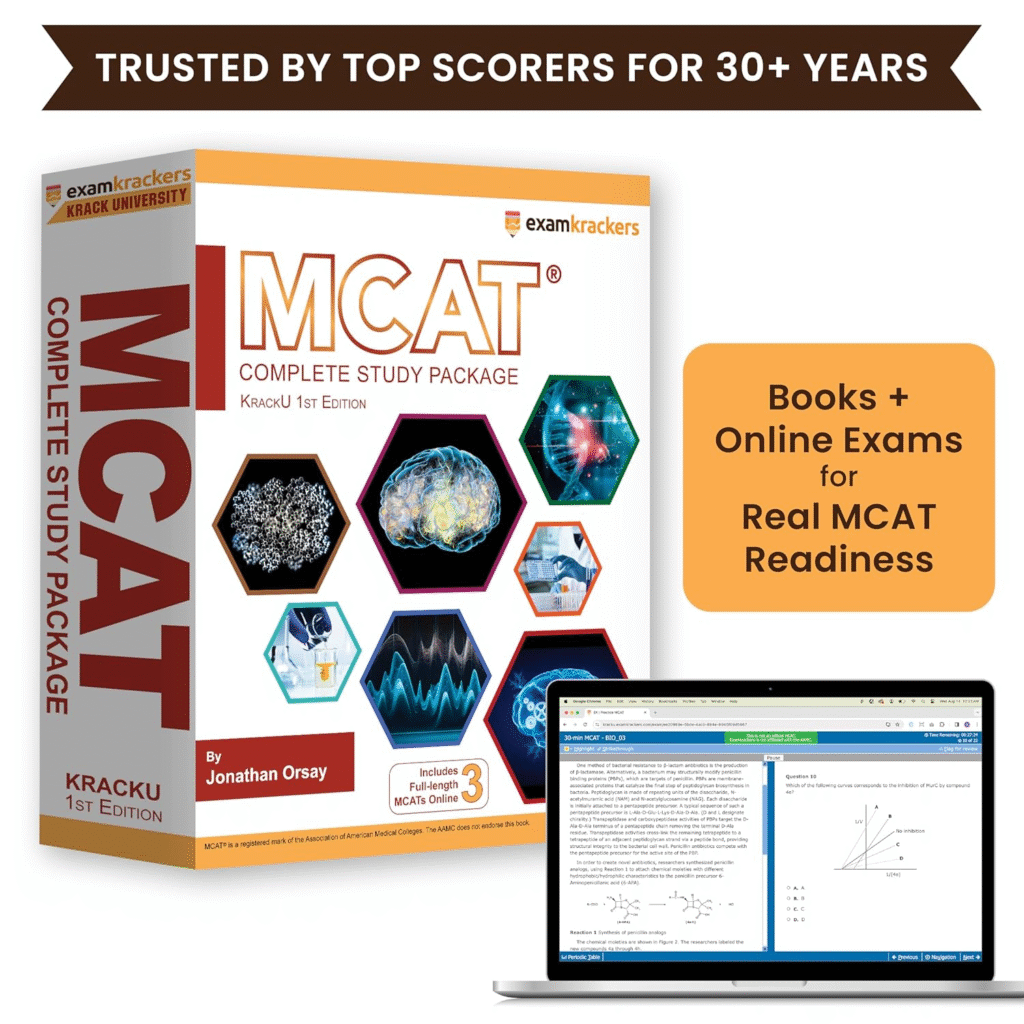
Examkrackers MCAT Complete Study Package is favored by students who prefer a clear, concise, and engaging approach to MCAT prep. Known for its accessible writing style infused with humor, it makes challenging topics more approachable without overwhelming learners. This package emphasizes critical thinking and practical application rather than sheer volume, making it a solid choice for students who want to study efficiently while retaining key concepts. According to user feedback on TestPrepInsight, Examkrackers consistently ranks as a top choice for streamlined MCAT review.
Key Features
- Six subject-specific books covering all MCAT topics
- Hundreds of practice questions are integrated throughout the material
- Strong focus on test-taking strategies and critical thinking skills
- Concise explanations designed to simplify complex concepts
Pros
Engaging and Easy-to-Understand Content
Examkrackers uses an approachable writing style with humor and relatable examples, making dense topics easier to grasp. This can reduce study fatigue and increase retention, especially for students who struggle with traditional textbooks.
Focus on Critical Thinking and Application
Rather than just memorization, the material emphasizes understanding concepts deeply and applying them to solve problems—skills vital for MCAT success, especially in sections like CARS and Behavioral Sciences.
Effective Test-Taking Strategies
The package provides actionable tips and tactics designed to improve time management, question interpretation, and test-day confidence. These strategies are often highlighted as a key reason for Examkrackers’ popularity on student forums like Reddit MCAT.
Suitable for Students Seeking a Less Dense Review
Compared to more voluminous options like Kaplan or Princeton Review, Examkrackers offers a lighter but still thorough review, ideal for students who prefer quality over quantity or those balancing MCAT prep with a busy schedule.
Cons
Less Comprehensive Coverage Compared to Competitors
While concise, Examkrackers doesn’t dive as deeply into every topic as Kaplan or Princeton Review. This can leave gaps in advanced content areas, making it less suitable for students aiming for top percentile scores or those needing an extensive review.
Limited Number of Full-Length Practice Tests
The package includes fewer full-length exams (usually one or two), which may not be sufficient for some students who benefit from extensive timed practice. Supplementing with official AAMC practice tests or other question banks is often necessary.
Less Detailed Science Explanations
Some users report that while the content is easy to understand, it may not provide enough detailed scientific depth, particularly in complex subjects like organic chemistry or biochemistry.
Student Feedback
Many MCAT test-takers praise Examkrackers for making prep less intimidating and more enjoyable. Reviews on sites like Amazon highlight its approachable style and effective strategies, although some recommend pairing it with additional practice tests for comprehensive preparation.
Pricing
- Priced at $229.99 for the complete set
- Available through Amazon and other major book retailers
Bottom Line
The Examkrackers MCAT Complete Study Package is an excellent option for students who want a clear, engaging, and manageable review without the overload of heavier prep books. Its focus on critical thinking and test strategies helps build confidence and improve performance, especially for those new to the MCAT or with limited study time. However, students aiming for a higher score or needing extensive practice exams should consider supplementing with official AAMC materials or additional resources.
4. AAMC Official Guide to the MCAT Exam, Fifth Edition
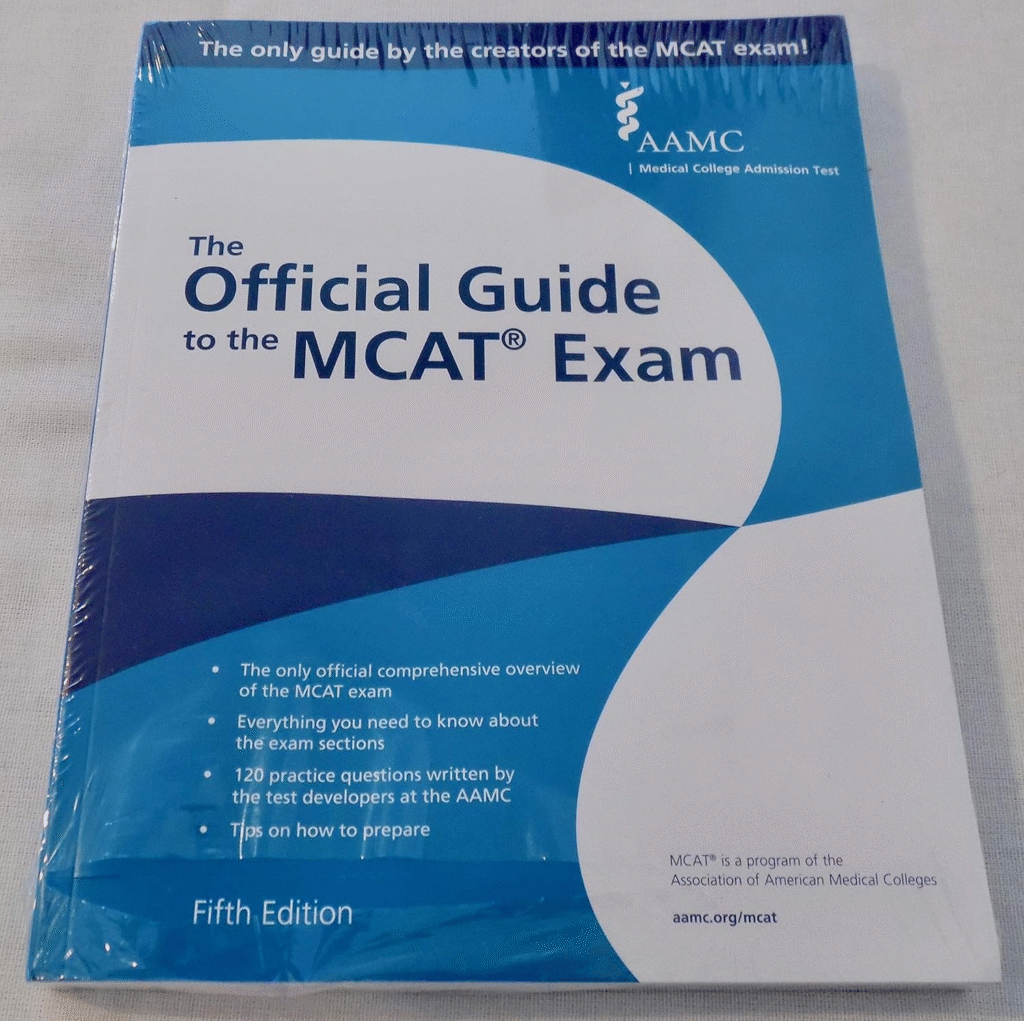
The AAMC Official Guide to the MCAT Exam is an essential resource for every MCAT candidate. Published by the creators of the MCAT—the Association of American Medical Colleges (AAMC)—this guide offers authoritative insights into the structure, content, and scoring of the exam. While it isn’t a content-heavy study tool, it’s unmatched in helping students understand how the MCAT is built, what skills are tested, and how to interpret their scores. According to AAMC data, this guide is used by a majority of top-scoring test-takers to build a strategic study plan.
Key Features
- In-depth overview of each exam section
- Clear explanation of scoring and percentiles
- Sample questions with official explanations
- Details on test-day procedures and expectations
Pros
Official Source from MCAT Creators
As the only guide written by the AAMC, this book delivers the most accurate and up-to-date information available. It ensures you understand exactly what the test makers are evaluating, making it a key part of any serious MCAT prep strategy.
Clarifies Exam Structure and Content
It breaks down each exam section—Biological and Biochemical Foundations, Chemical and Physical Foundations, Psychological and Social Foundations, and CARS—explaining the types of questions you’ll face, the skills being tested, and how much time you’ll have. This clarity helps eliminate surprises on test day.
Detailed Explanation of the Scoring System
Understanding the MCAT scoring scale can be confusing. This guide clearly outlines how raw scores are converted to scaled scores, how percentiles work, and how medical schools interpret your results. It’s especially useful when setting target scores or evaluating your practice test performance.
Sample Questions with Realistic Format
The book includes 120 practice questions (30 per section) with thorough explanations that match the AAMC’s style. These are ideal for understanding how official MCAT questions are phrased and what logic is expected in your responses.
Useful for Planning Study Strategies
This guide helps students build a study plan based on how the test is structured, which is especially helpful for first-time test-takers. It also offers tips on how to approach each section based on skills rather than rote memorization.
Cons
Not a Comprehensive Content Review
The guide doesn’t teach you the science and reasoning skills required on the MCAT. It lacks in-depth coverage of subjects like Physics, Biochemistry, or Psychology, so you’ll need a separate resource for full content review (e.g., Kaplan or Princeton Review).
Limited Number of Practice Questions
While the included questions are official and well-explained, there are only 120 in total. This is not enough for full-scale practice, especially for students aiming to simulate full-length tests or develop endurance. Many students pair this book with the AAMC online practice bundle to get additional exposure.
No Full-Length Practice Test
The book does not include a full-length practice exam, so it cannot replace a full MCAT simulation. That makes it more of a foundational planning tool than a direct test-prep resource.
Student Feedback
Many students on Reddit’s r/MCAT and other forums recommend the Official Guide as a starting point before diving into full prep courses or content review books. It’s widely praised for providing a clear sense of what to expect and how to prepare strategically, but not as a standalone study tool.
Pricing
- Approximately $35
- Available in print or as an eBook through the AAMC website and Amazon
Bottom Line
The AAMC Official Guide to the MCAT Exam, Fifth Edition is a must-have companion for MCAT prep—not for its content review, but for its unmatched insight into the structure, scoring, and logic of the test. It’s best used at the beginning of your prep journey to set expectations, design a study plan, and get familiar with official question formats. Pair it with more content-focused resources and full-length practice tests for a complete preparation strategy.
5. Princeton Review MCAT Prep, 2024–2025: 4 Practice Tests + Complete Content Coverage
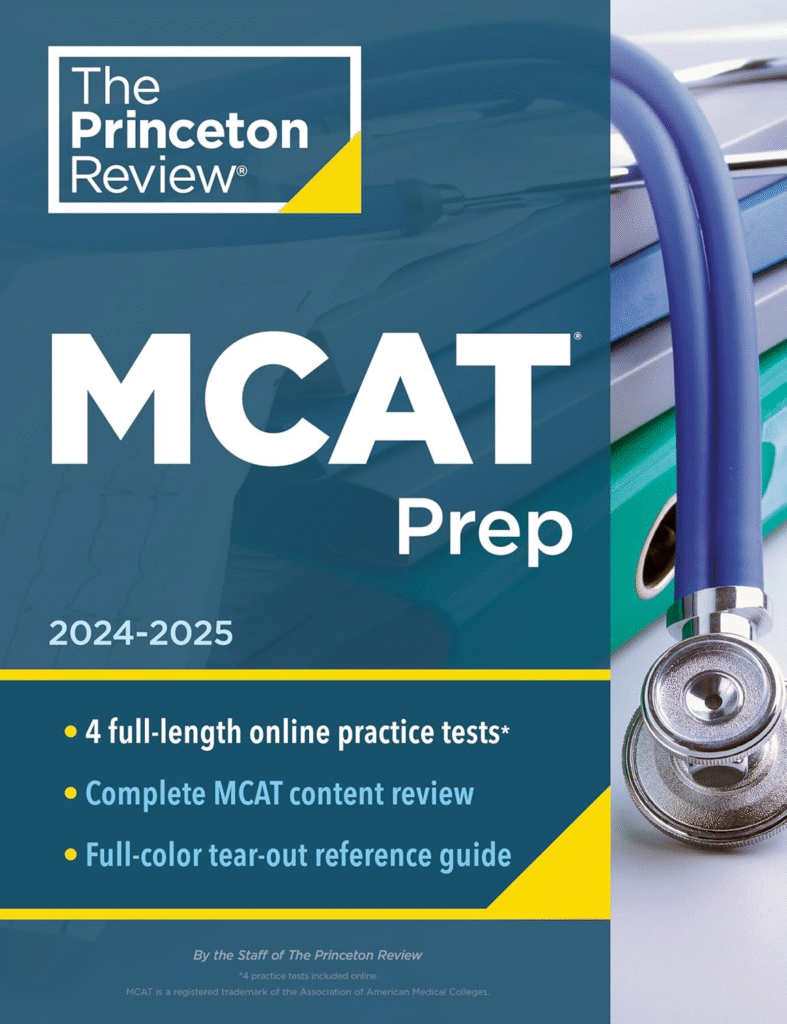
The Princeton Review MCAT Prep 2024–2025 is a popular option for students looking for a well-rounded approach that balances content review with realistic practice. With over 35 years of test prep experience, Princeton Review’s resources are trusted by thousands of pre-med students annually. This guide includes content coverage across all MCAT subjects, along with four full-length practice tests designed to mirror actual testing conditions. According to Princeton Review, their MCAT prep students often see score increases of 10+ points with consistent study.
Key Features
- Four full-length MCAT-style practice exams
- In-depth content review across all exam sections
- Strategies and test-taking techniques tailored for MCAT success
Pros
Well-Balanced Approach
Unlike resources that focus heavily on either theory or practice, Princeton Review offers a balanced mix. This makes it ideal for students who want to reinforce their understanding and immediately apply it through exam-style questions.
High-Quality Practice Exams
The included practice tests replicate MCAT exam conditions in terms of question format, length, and timing. This helps students build mental endurance and fine-tune pacing. The AAMC recommends practicing under test-like conditions to reduce anxiety and improve performance.
Accessible Content and Clear Strategies
The explanations in this book are written in an approachable tone, making complex concepts easier to grasp. Additionally, the book includes MCAT-specific test-taking strategies—from time management to critical reading—that are especially helpful for navigating tricky sections like CARS and Biochemistry.
Trusted by Many Students
On platforms like Reddit’s r/MCAT, users often recommend Princeton Review for its clarity, structure, and strategic advice, especially for students who are early in their prep journey or prefer structured guidance.
Cons
Not as Deep as Other Resources
While the content coverage is solid, it may not go into the same level of depth as more comprehensive sets like Kaplan or Blueprint. Students aiming for top-tier scores (515+) might find themselves needing additional resources for advanced topics.
Practice Tests May Vary in Difficulty
Some users report that the Princeton Review practice exams are slightly easier than the actual MCAT, particularly in the CARS section. This can give a false sense of readiness if not paired with more rigorous practice, like official AAMC practice exams.
Limited Online Resources
Compared to competitors that offer robust online platforms, Princeton Review’s digital materials are somewhat basic. Students who prefer interactive or video-based learning may want to supplement with additional tools or platforms.
Student Feedback
Students appreciate the straightforward explanations and practical strategies offered in this book. It’s commonly recommended on MCAT prep forums as a solid first step or companion to more content-heavy materials. Many report that it helped them build confidence and structure their study plan effectively.
Pricing
- Around $80–$100
- Available via Amazon and the Princeton Review
Bottom Line
Princeton Review MCAT Prep, 2024–2025 is a strong, well-rounded prep guide ideal for students who want a solid foundation and strategic approach without being overwhelmed by excessive detail. While it may not be as exhaustive as other programs, its blend of practice and content, combined with trusted strategies, makes it a smart choice for students in the early or middle stages of MCAT prep. For best results, it’s a great companion to official AAMC materials or a more in-depth course.
Tips for Choosing the Right MCAT Prep Book
Best MCAT Resources? How to Decide What Works for You
Choosing the right MCAT prep book can make a major difference in how efficiently and effectively you study. With so many options available, it’s important to find a resource that matches your personal study habits, schedule, and score goals. Here are a few smart tips to help guide your selection:
1. Assess Your Learning Style
Not all study methods work for everyone. If you’re a visual learner, look for books rich in diagrams, charts, and color-coded summaries—like Kaplan’s or Examkrackers’ sets. For those who prefer detailed reading, text-heavy guides such as Princeton Review or the Berkeley Review may be more effective.
2. Consider Your Timeline
If you’re starting late or have only a few weeks to prepare, you’ll want a prep book that focuses on high-yield content—the topics most likely to appear on the exam. Some resources are more streamlined and built for quick review, while others dive deep and are better suited for long-term study plans.
3. Evaluate Practice Materials
The best MCAT prep books include realistic practice tests and questions that mimic the format and difficulty of the actual exam. According to the AAMC, full-length practice exams are critical to building stamina and exam-day readiness. Make sure your book offers not just questions but also thorough explanations for each answer.
4. Budget Accordingly
MCAT prep can get expensive, but more costly options often offer greater value. Bundled book sets may include online access, video lectures, or interactive quizzes that boost your prep efficiency. That said, if you’re on a tight budget, individual review books paired with free or low-cost AAMC resources can still work well.
MCAT Prep Book Comparison Table
Use the chart below to compare top-rated MCAT prep books based on subject coverage, included practice resources, study format, and who they’re best suited for.
| Prep Book Set | Subjects Covered | Practice Tests | Format | Best For |
|---|---|---|---|---|
| Kaplan MCAT Complete 7-Book Subject Review | All 7 MCAT subjects (Biology, Biochem, Chem, Physics, Psych/Soc, CARS) | 3 full-length online tests | Print + Online | Comprehensive review for serious test-takers |
| Princeton Review MCAT Prep (2024–2025) | All MCAT subjects with a focus on strategy | 4 full-length tests | Print + Online | Students who want a balance of review and exam strategies |
| Blueprint MCAT Books + Online Resources | Full MCAT content with visual emphasis | 6 online full-length tests + analytics | Print + Interactive Online Platform | Visual learners & students aiming for high scores |
| Examkrackers Complete Study Package | Condensed high-yield summaries of all core subjects | 32 mini exams + 1 full-length test | Print only | Fast-track self-studiers and retakers |
| Barron’s MCAT (3rd Edition) | General science review with quick refreshers | 2 full-length practice tests | Print + Online Access | Budget learners or early-stage prep |
| Mometrix MCAT Prep Book (2025–2026) | High-yield summaries + test strategies | 2 full-length practice tests | Print only | Last-minute review or supplemental prep |
| The Berkeley Review (TBR) | Deep dive into MCAT science topics | Varies by subject (known for passages) | Print only | Students needing intensive science practice and depth |
Do You Need a Prep Book? Or Is a Course Better?
MCAT prep books have long been a go-to resource for aspiring medical students, but with the rise of structured courses and online platforms, it’s worth asking: Is a prep book enough, or should you invest in a full MCAT course?
The answer depends on your study style, timeline, and target score. Below, we break down the pros and trade-offs of both options to help you make the right decision.
When MCAT Prep Books Are Enough
If you’re a self-motivated learner who’s comfortable managing your schedule, prep books can be more than sufficient. Most top-tier books—like Kaplan, Princeton Review, and Examkrackers—include comprehensive subject coverage, practice questions, and even full-length exams that mimic the real test.
According to the AAMC, the average MCAT taker studies for 200–300 hours, and prep books provide enough material to support this timeline effectively. They’re also far more affordable, often costing under $200 in total for a full set.
Best for:
- Students on a budget
- Self-paced learners
- Retakers who already know their weak areas
When a Course Might Be Better
If you’re struggling to stay on track or aiming for a 515+ score, a structured prep course can offer significant advantages. These programs—like Blueprint, Kaplan Live Online, and Princeton Review 515+—come with study plans, live instruction, analytics, and thousands of practice questions.
Some courses also offer score guarantees or personalized tutoring. A 2022 Blueprint study found that students who used their full MCAT course improved their score by an average of 13 points from their diagnostic test.
Best for:
- Students who need accountability
- First-time test takers who are unsure where to start
- Test-takers with ambitious score goals or tight deadlines
A Middle Ground: Combine Both
Many students find success by using a hybrid approach—studying content through prep books while taking a self-paced or live course to boost test-taking skills and fill knowledge gaps. Pairing prep books with official AAMC practice materials and spaced repetition apps like Anki can maximize your retention and efficiency.
MCAT Study Schedules and Planning Tips
Creating an effective study schedule is essential for MCAT success. According to the Association of American Medical Colleges (AAMC), most students dedicate 200 to 300 hours of study over 3 to 6 months, averaging about 15 to 20 hours per week, depending on their baseline knowledge and target score.
1. Start with a Diagnostic Test
Begin your preparation by taking a full-length practice exam, such as the official AAMC Practice Test. This helps identify your strengths and weaknesses, allowing you to focus your study time effectively.
2. Break Content Into Manageable Blocks
Divide your prep materials by subject, focusing on one or two topics each week. Rotating subjects regularly keeps content fresh and helps prevent burnout.
3. Incorporate Practice Questions Early
Integrate practice questions and passage exercises from the start. Resources like UWorld MCAT and Kaplan’s question banks offer realistic practice to build critical thinking skills alongside content review.
4. Schedule Regular Full-Length Practice Tests
Aim to complete at least 3 to 5 full-length exams throughout your study period. Simulate real test conditions, including timing and breaks, to build stamina and improve pacing.
5. Review and Adjust
After each practice test, analyze your results to identify areas needing more attention. Adjust your study plan accordingly, focusing on weaker topics while maintaining strengths.
6. Build in Breaks and Self-Care
Avoid burnout by scheduling rest days and self-care activities. Consistent, balanced study routines improve retention and reduce anxiety, according to study habits research.
Using tools like Google Calendar, MCAT planners, or study apps such as Anki can help keep your schedule organized and your preparation on track. Remember, consistency is key—steady, focused study beats last-minute cramming.
Common Mistakes to Avoid When Using MCAT Prep Books
Using the best MCAT prep books won’t guarantee success if you fall into common traps that hinder progress. Avoid these pitfalls to make your study time more effective:
1. Passive Reading Without Practice
Just reading chapters isn’t enough. You need to actively test your knowledge with practice questions and passage-based exercises to truly retain information and apply it on test day.
2. Ignoring AAMC-style Questions
While prep books are great for reviewing content, they don’t always mimic the real exam’s format. Supplement your studies with official AAMC materials, which closely reflect the actual test’s style and difficulty. These are available through the AAMC MCAT Official Prep resources.
3. Not Reviewing Mistakes Thoroughly
Simply knowing the correct answer isn’t enough. Understand why you missed a question—was it a content gap, misreading, or a timing issue? Use detailed explanations from resources like UWorld to learn from errors and adjust your strategy.
4. Relying on a Single Book
No single resource covers every topic perfectly. High scorers combine multiple books and tools, such as Kaplan for content, UWorld for practice, and Anki for memorization, to create a balanced prep plan.
5. Skipping Test-Taking Strategies
MCAT success requires more than knowledge; you must master timing, pacing, and question elimination. Books like Princeton Review cover these strategies, and platforms like Blueprint MCAT offer additional guidance.
6. Poor Time Management
Cramming last minute causes burnout and poor recall. Follow a structured schedule with realistic weekly goals to study consistently and avoid stress.
Avoiding these mistakes will help you make every study hour count and improve your chances of a strong MCAT score.
Final Thoughts: Choosing the Best MCAT Prep Book for You
The right MCAT prep books can make a big difference in how effectively you study and how confident you feel on test day. If you want full content coverage and guided practice, comprehensive sets like Kaplan’s 7-Book Review or Princeton Review’s 2024–2025 edition are excellent choices. For deeper practice, tools like UWorld offer high-quality questions and detailed explanations.
To get the most out of your prep, combine books with official AAMC practice tests and a structured schedule. According to The Princeton Review, students using a well-rounded prep plan often see score improvements of 5–10 points.
Ultimately, success comes down to consistency, the right resources, and smart strategy. With the right tools, you can approach the MCAT with confidence and clarity.
Frequently Asked Questions (FAQs)
1. How should I study from MCAT prep books?
The most effective approach is to combine reading with active practice. Rather than passively going through chapters, test your understanding using end-of-chapter questions, flashcards, and timed passages. Many students on forums like Student Doctor Network recommend dedicating more time to practice problems than to reading alone.
2. Is it necessary to use multiple MCAT prep books?
While one comprehensive book or set may be enough for content review, supplementing with additional tools like UWorld, Anki, or AAMC practice exams can strengthen your grasp of high-yield topics and improve question analysis. Many top scorers build a study plan using two or more resources for balance.
3. Should I take notes while studying from the MCAT prep books?
Note-taking helps reinforce learning, but avoid spending excessive time on rewriting content. Focus instead on summarizing complex concepts and reviewing them through active recall techniques like flashcards or teaching the material out loud. Combine this with review sessions to enhance retention.
4. How can I avoid burnout during MCAT prep?
Stick to a realistic and flexible study schedule. Mix in lighter days with heavier ones and include breaks. As students on Reddit have noted, pacing yourself and not overloading any single day with too much content or testing is key to staying consistent.
5. When should I start taking full-length practice tests?
Start full-length practice exams once you’ve reviewed at least 60–70% of the content. Ideally, begin 6–8 weeks before your exam date, and take a full-length test every 1–2 weeks. According to many premed students, early exposure to full exams can help with pacing and endurance, reducing last-minute anxiety.
